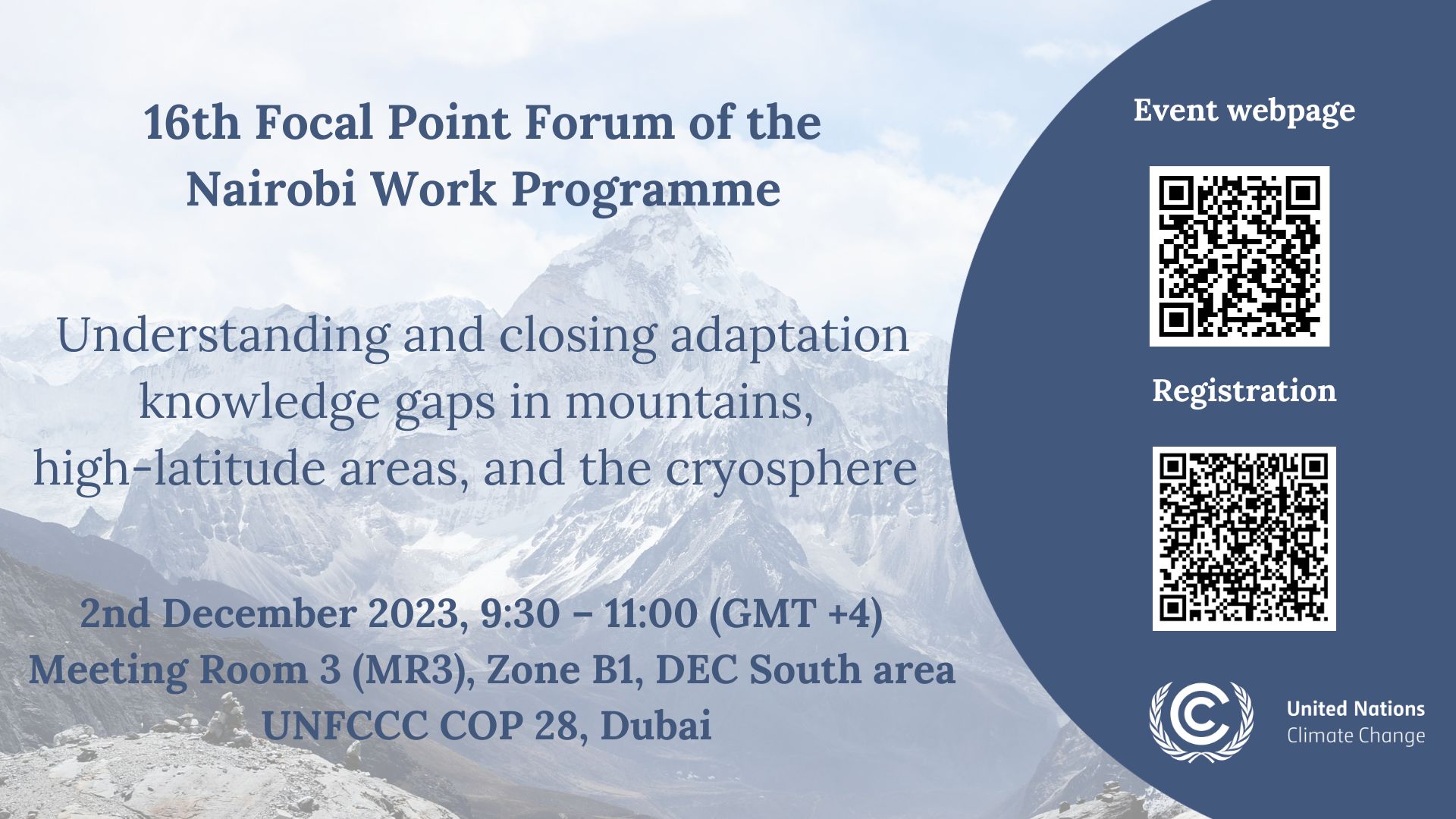1. Mandate:
The NWP 16th Focal Point Forum on addressing adaptation knowledge gaps in mountains, high-latitude areas, and the cryosphere will be held in conjunction with the 28th session of the Conference of Parties to the UNFCCC (COP28) (see Para 24 (i), FCCC/SBSTA/2023/4)
2. Objectives of the Focal Point Forum
The focus of the NWP, with its network of almost 450 partner organizations, is to enhance implementation of adaptation action by closing gaps in knowledge on adaptation and resilience identified by Parties, in particular developing country Parties, including the LDCs and SIDS, in line with the objectives of the Paris Agreement.
The NWP has following modalities in closing knowledge gaps related to adaptation in countries: Building a large, diverse global network of expertise and experience and establishing institutional linkages under the NWP:
- Collaborating with experts, networks and Parties at the subregional level under LAKI;
- Collaborating with partner organizations and experts within the NWP thematic expert groups as well as with partner organizations of LAKI and the UN Climate Change and Universities Partnership Programme on new and existing adaptation initiatives;
- Pursuing long-term strategic engagement with the constituted bodies to support implementation of their workplans and adaptation-related mandates, including in the context of the process to formulate and implement national adaptation plans.
Within the overarching objectives of the Focal Point Forums, the 16th Focal Point Forum will provide an interactive space and facilitate collaboration among Parties, NWP partner organizations, and experts, including those from developing countries and those working on national adaptation in thematic areas of mountains, high-latitude areas, and the cryosphere under the following three clusters (These will be addressed in two parallel breakout groups, one focusing on the mountains and one focusing on high latitude and the cryosphere):
1) Knowledge
-
What is the existing knowledge on good practices and lessons learned in adaptation and resilience specific to these thematic areas in countries, in particular developing countries, including the LDCs and small island developing States? What knowledge could be disseminated, synthesized, repackaged under the NWP to the provision of practical and relevant knowledge in countries and regions, including local knowledge and Indigenous science, values and knowledge systems? How to enhance the provision of information and knowledge products that are relevant, tailored and accessible to Parties and those responsible for implementing adaptation action at the subnational, national and regional level, ensuring that these are available in the relevant formats and languages, to the extent possible?
- What “new” knowledge in terms of assessments and tools could be developed to help countries scale up adaptation action, at the subnational, national and regional levels?
2) Repositioning the NWP to address current and future knowledge needs to ensure that communities and countries are equipped with relevant knowledge and tools to ensure that the adaptation actions they take move them towards a climate-resilient future: What pre-emptive/planned, contingent and other actions could be designed and delivered to address the full spectrum of adaptation and resilience?
3) Developing and strengthening linkages with processes under and outside the UNFCCC Convention:
- Providing relevant knowledge and expertise to constituted bodies upon request to support them in undertaking their work related to the process to formulate and implement national adaptation plans, including in relation to finance, capacity-building and technology transfer at the subnational and national level;
- Developing new linkages with processes under the Convention and the Paris Agreement, such as the global stocktake, as appropriate, focusing on the provision of relevant knowledge or inputs to support work under these processes;
- Developing and strengthening linkages with relevant processes/initiatives outside the Convention.
3. Target audience:
Parties, UNFCCC national focal points, experts on mountains, high-latitude areas, and the cryosphere, including local communities and indigenous peoples, NWP partners, development partners, the private sector, UNFCCC constituted bodies and UNFCCC observers.
4. Agenda
|
Time
(GMT +4)
|
Agenda |
Speakers |
| 9:30 – 9:50 |
High-level opening segment |
|
| 9:30 – 9:35 |
Welcoming remarks
|
Chair of the Subsidiary Body for Scientific and Technological Advice (SBSTA)
|
| 9:35 – 9:50 |
Keynote: Scene setting on current landscape and international context
|
Dr. Stefan Uhlenbrook, Director of Hydrology, Water and Cryosphere, World Meteorological Organization (WMO)
|
| 9:50 – 10:40 |
Technical segment: Breakout group sessions in two clusters
|
|
| 9:50 – 10:00 |
Experiences from countries |
Mountains:
- Ms. Tashi Pem, Director General at the Department of Environment and Climate Change in Bhutan
Adaptation possibilities in high-latitude areas and the cryosphere:
- Ms. Lorena Pérez Roa, Third Secretary, Division of Environment, Climate Change and Oceans, Ministry of Foreign Affairs, Chile
- Ms. Jacqualine Denise Schaeffer, knowledge holder from the Arctic region
|
| 10:00 – 10:40 |
Discussions based on the guiding questions (see above) |
Mountains:
- Dr. Carolina Adler, Director of the Mountain Research Initiative
High-latitude areas and the cryosphere:
- Mr. Stefan Ruchti-Crowley, Director, Climate Negotiations and Arctic, International Cryosphere Climate Initiative
|
| 10:40 – 11:00 |
Reflection and closing (Plenary) |
|
| 10:40 – 10:55 |
Report back of key reflections in the breakout group discussions |
Mountains:
- Dr. Alvin Chandra, Global Coordinator for Adaptation Policy and Partnerships and oversees the Global Adaptation Network
High-latitude areas and the cryosphere:
- Ms. Amy Duchelle, Team Leader Forests & Climate, FAO
|
| 10:55 – 11:00 |
Closing remarks
|
Chair of the Subsidiary Body for Scientific and Technological Advice (SBSTA) |
